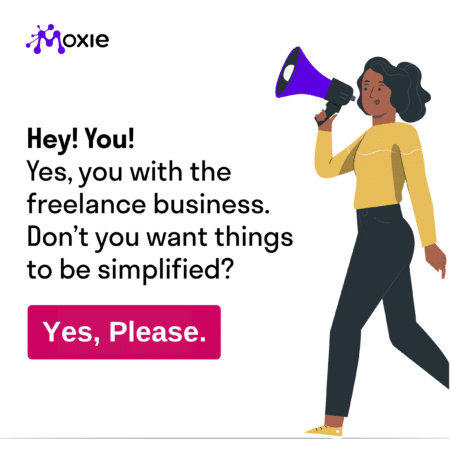Note: This episode contains legal advice. We recommend you consult a lawyer before making legal decisions in your business.
When freelancers expand their services, we often bring on subcontractors to handle work outside our wheelhouse. In fact, we recommend this to call-in guests all the time on Freelance to Founder. But what’s the best way to price those third-party services for our clients?
In this Q&A episode, we tackle a question from listener Kiki about marking up subcontractor fees. She also asks whether her client needs to sign two separate contracts in these scenarios.
Key Takeaways from this Episode:
- Don’t be afraid to markup subcontractor fees 30-50% or more to account for your time, effort and risk.
- The more active management you provide, the higher your markup should be.
- Have your client sign just one contract with you, then you sign a second contract with the subcontractor.
- Make sure your subcontractor agreement mitigates your risk if they can’t deliver.

Kiki’s Pricing Dilemma
Kiki explains that she normally provides branding services to clients, with the occasional simple website built on Squarespace.
But a new client approached her about a large custom web project outside Kiki’s wheelhouse. She decided to partner with a web development agency to build the site, while handling the project management and ongoing client relationship herself.
Here’s Kiki’s multi-part question:
Part 1: Should I charge a little more than the subcontractor quoted me, since I’m managing the job? For example, if they quoted $1400, can I charge the client $1600?
Part 2: Do my clients need to sign two separate contracts in these situations?
Let’s break down our answers on both counts…
To Upcharge or Not to Upcharge
Kiki asked if she should mark up the $1400 subcontractor fee when billing her client, since she’s managing the project.
Our unequivocal answer: Yes, absolutely upcharge your clients!
But we actually think Kiki isn’t charging enough of a markup. We suggest she add at least a 30-50% markup, if not doubling the fee. Here are a few reasons why:
When you are providing active project management, rather than just giving a referral, you are doing much more work for the client. This additional effort in overseeing and coordinating the project warrants charging higher fees.
Similarly, when you take on all of the risk and legal liability if the project goes wrong, you should be compensated for assuming that exposure through an upcharge.

Your expertise also earns your clients’ trust in your recommendations and vendor choices. This confidence you instill through experience and wisdom commands higher pricing for your services.
Plus, handling all client communications and accountability itself requires significant project management efforts that must be fairly compensated.
If nothing else, the time you will spend working with the subcontractor has immense value to the client. You need to bill appropriately for all these administrative duties based on the time invested and importance to the client.
Essentially, the more active role you play, the higher your markup should be. But even for straight referrals, a small markup helps cover time spent coordinating.
Consider Other Factors Too
Pricing also depends on other factors like your current demand and availability. If your pipeline is packed and schedule mostly booked, you can justify higher rates. But if you have open capacity and need to fill it, lower markups may be prudent.
The type of client also matters. Big companies expect agency-level markups, while small business owners may be scared away at 100% premiums. You’ve just got to know your audience in order to get this one right.
But for significant subcontracted services, routinely mark up at least 30-50%. You provide immense value beyond just vendor referral.
Do Clients Need to Sign Two Contracts?
Ok. Question number 2: Kiki also asked whether her client needs to sign contracts with both her AND the subcontractor in these arrangements.

Our take? No. Clients only need to sign one agreement with you, the primary project manager. However, you should sign a second contract outlining scope, risk, terms and other details with the subcontractor.
It’s most likely that your client only wants to manage a single agreement – the one with you as the primary project lead. Forcing them to sign contracts with your subcontractors as well would overcomplicate things and muddy the waters.
As the main point of contact, you remain fully accountable for delivering the completed project to the client. Requiring additional agreements between your client and subcontractors would expose the client to more risk and complexity that they should not have to deal with. On your end, you need to formalize expectations, pricing, liability and other details with any subcontractors you use anyway.
Having a thorough contract with a subcontractor allows you to protect yourself should anything go wrong. Within this subcontractor agreement, you must include provisions that mitigate your own risk financially or logistically if the subcontractor cannot deliver their portion of the project scope for any reason. Using strong contracts gives you options to cover your bases in the event your subcontractor lets you down.
We hope these tips help you start benefiting from subcontractor relationships while avoiding pricing and legal pitfalls! Remember to submit your question and we’ll do our best to answer it on the next Q&A episode.
Episode Transcript
This transcript was auto-generated and may have grammatical errors.
00:00.00
Preston
Hello and welcome back to another q and a episode of freelance to founder as you know every Tuesday we do these short q and a episodes answering questions from listeners like you you can visit freelance to a founder dot com slash ask and submit a quick question there and we’ll do our best to answer it on the air. And this Thursday we have coming up a fullleng um, a lot of times almost an hour long coaching call with a freelancer who calls in and we help them work on their business. Lots of fun. So be sure to join us on Thursdays as well. For those episodes. I’m Preston Lee with milo.co where we help freelancers grow their businesses and ah joining me of course is my friend Clay Mosley from gettrify.com hey Clay give me a quick plug for gettripify.com clay.
00:39.90
Clay
Hello preston lee with millow.co is ah ah getrify.com is the best marketing framework that you can buy on the internet.

00:51.92
Preston
I Feel like that should have been the pitch for our last Q and a episode where we talked about marketing plans. Oops.
00:55.23
Clay
I Know that’s all right if people are curious. They can go to they can go to my website.
01:02.97
Preston
Ah, that’s right visit gettripify.com Clay ah Clay is awesome to to co-host this show and has been doing so for years. So be sure to go and support the work that he’s doing. We’ve got a question here today from kiki. I’m going to summarize a little bit so Kikis is a branding expert sometimes does some basic like Squarespace websites but a client recently asked her to take on a more robust website way out of her skill level. It sounds like and so she’s decided to partner with a web dev agency to get the job done. So her question is. Should I charge a little more than the agency quoted me since I’m the 1 handling and selling the job. For example, if the web agency says it’s going to be $1400 can I try to sell the web piece for $1600 since I will be managing it. Um and then she has a second question so it’s a 2 wo-part question today she says. Have a contract and they have a contract does my client need to sign 2 contracts. So first question is can I upcharge basically second question is does my client need to sign 2 contracts. Do you want to take a stab at it. Clay.
02:10.20
Clay
Ah, the the answer to the first question on whether you should upcharge. Um, absolutely I think yeah and especially so the the differentiator here is.
02:15.12
Preston
Yes, and have our permission.
02:26.49
Clay
The fact that you you are going to manage it manage the project if this was a straight referral and the client is going to work directly with the web agency and you are kind of like you just do the branding and outside of that your hands off then I would say not. Like because you’re not involved with that project. But if you’re involved managing that web project. Yeah I would I would upcharge and I would up charge. Um, at least 30% in my opinion.
02:58.82
Preston
yeah yeah I was going to say I think Kiki is not charging enough. So it’s so $200 of $1400 would be about 14% so not even 15% markup um I’m with you at least 30 Maybe even like 50%
03:01.55
Clay
Yeah.
03:09.65
Clay
Ah.
03:14.23
Clay
Prime more? Yeah I if I was at 1400 like for me I would I’d probably charge like 25 to 3000 um yeah and here’s here’s the reason why there’s because um, there’s going to be a lot of people here that disagree with that. Um.
03:15.64
Preston
Yeah.
03:22.56
Preston
I Was gonna say I’d probably double that. Um, yeah, they’re gonna say we’re greedy and and how dare we take so much. Yeah.
03:30.80
Clay
Yeah, it’s not. It’s not greed. It’s It’s one. Okay, she’s managing the project there’s time and effort there so you need to get pay for it to if and this kind of this is kind of a leeway into. Ah.
03:39.40
Preston
A.
03:48.87
Clay
Like a transition into the second question this is especially important if there is one contract and that is with you and you are white labeling the agency because now there is a legal.
04:02.60
Preston
Yep.
04:06.77
Clay
Exposure here and you should get paid for that because if something goes wrong and the the client decides to Sue for whatever reason they’re going to sue you not the web agency right? yep.
04:19.10
Preston
Yeah, you’re assuming all the risk with the client but also not even the legal risk because you know the likelihood of getting sued is maybe fairly low for most people. But you think about like what if this web designer that you’ve hired or this Dev agency that you’ve hired what if they decide they can’t finish the project and you have to go hire someone else.
04:38.94
Clay
Yep.
04:38.97
Preston
What if you know what? if? um, what if they’re not able to complete it on time and you have to go find someone else like there’s There’s all these variables you are assuming 100% of the risk of this project and so you you need to build in a buffer for yourself and. And just be rewarded for taking on the risk people in business who take risks are the ones who end up charging more.
05:02.30
Clay
Um, absolutely yeah, so it all comes down to is it going to take it any more time and and or risk.
05:13.40
Preston
Yep.
05:13.34
Clay
If the answer to the either 1 of those questions or both is yes you should absolutely charge more for sure.
05:21.28
Preston
Yep, and and just so you know this happens in the business world all the time just so that you don’t think that clay and I are just like throwing numbers out there being super greedy. You know most retailers Mark up by a hundred percent 50 to 100% um can oh yeah.
05:30.39
Clay
Ah.
05:36.42
Clay
Contractors too like home contractors like you’re building a house like there’s a general contractor that’s in charge of everything and they subcontract electrical plumbing things like that like yeah, they take the risk so they’re going to. They’re charging more than is if you.
05:39.21
Preston
Yeah, yep.
05:49.94
Preston
Yep.
05:52.74
Clay
Were to hire the Electrician directly.
05:55.19
Preston
And then when the homeowner goes to them and says um, there’s blue tile in our kitchen we actually wanted green tile right? Then they’ve assumed that risk and they have to eat that cost and then they pay for that and so yeah, and so yes, assuming all that risk and managing the project is worth a lot and and that’s.
06:06.70
Clay
Yep.
06:09.99
Clay
Her her.
06:12.75
Preston
Actually that’s maybe another reason is like you have to recognize the value that you’re presenting right? and you’re going to take the information from your client on what they want out of a website and you’re going to pass that along along in a clear way so that ultimately they get what they want at the end of the day that’s like communicating with a web designer. Managing that whole process. That’s gonna that’s something that your client doesn’t want to do probably right? and so you’re going to take that on for them and so that’s worth money as Well. So I think there’s lots of reasons to charge extra. We think you’re probably not charging enough Kiki so I would go up in your in your.
06:35.57
Clay
Yeah.
06:49.23
Preston
Percentage I would probably double it or more. Um, but yeah, should we move on to the second question or is there more you want to add there for me the second question when you brought up like the contractor you know, working on a home subcontractors for me that.
06:53.41
Clay
Yeah, no I think that’s good. Yeah, let’s move on.
07:08.32
Preston
Ah, clarifies this contract question a lot right? So I have you know we finished our basement in our home a few years ago and we had 1 general contractor who subbed out all the jobs and we had one contract that we signed with him.
07:09.33
Clay
Just and.
07:25.28
Preston
And it’s not like he had me every time the sheet rock gate guy came in I didn’t have to sign with him and then the flooring guy came in and I signed with him like none of that happened right? He has an agreement with them but I have an agreement just with the the 1 guy who’s taking point on the project.
07:32.63
Clay
Yes.
07:42.36
Clay
I think it’s a really good point I think in this scenario there’s going to be 2 contracts. It’s just who who is it with um so there can be 1 contract between you between the client and you.
07:48.80
Preston
Yep.
07:56.12
Clay
But like the second contract if you’re going to work with this web agency needs to be between you and the web agency.
08:01.60
Preston
Yeah, well because you’re you’re essentially the client on the 1 hand, you’re the freelancer or the agency and on the other hand, you’re the client right? and so there should be 2 different agreements.
08:12.95
Clay
Yep, yeah, there should be 2 and there’s not. There’s no right or wrong way to do that. Just make sure there’s 2 You know what? I mean. Ah.
08:21.89
Preston
Yeah, and again coming back to that idea of like assuming all the risk right? I I would I would put as much risk on the other people as possible to sort of mitigate your your risk a little bit and meaning. Like in your contract with the with the dev that you’re going to work with or the agent’s dev agency like what happens if they can’t deliver right? Well maybe they refund your money or or maybe they hand the project off to someone else like some.
08:46.82
Clay
Ah.
08:53.97
Preston
Some Dev agencies I’ve worked with actually won’t hand the project off to anyone else ever no matter what and that’s bonkers to me. But um, so you got to make sure all that’s in there to protect you and then I was just going to say like and then like when you’re on the other end when you’re making a.
08:57.25
Clay
Right.
09:06.62
Clay
Ah, yeah.
09:12.18
Preston
Contract with your client. It’s like what happens if the timeline goes bad because your subcontractor didn’t hit the timeline. How can you mitigate your risk there. So it’s just important to think through that whole relationship.
09:19.20
Clay
Yeah, yeah, not just work scope but also like what’s the what’s the protocol on client contact who who when like when and if is it appropriate for.
09:30.26
Preston
Yeah, yeah, yeah, that’s true.
09:38.99
Clay
All parties to to work with the client directly and that’s going to be that’s going to be an agreement between you and the web agency.
09:43.40
Preston
Yeah,, that’s a good point. Yeah, if at all right if you want them communicating at all.
09:52.97
Clay
Yeah, and and if not that I still think that needs to be spelled out in the agreement. Yeah.
09:59.39
Preston
I agree. Yep yeah yeah, anything else to add I feel like those were pretty straightforward answers. Um, first of all, you have our permission to upcharge second of all, no, you don’t need to have your client sign 2 contracts just sign one and then you sign the contract with the other anything else.
10:05.42
Clay
Um, yeah I think that’s it.
10:14.49
Clay
Also also full disclosure. We are not lawyers. Ah.
10:17.79
Preston
Oh yeah, thanks for adding that Yes, we are not lawyers or accountants. You cannot ah yeah, consult your own legal professionals. We’re just a couple of entrepreneurs doing our best and making it up half the time if we’re being honest, but that’s the joy of entrepreneurship. So ah, we have we have been down the road a couple times we’ve been through a few of these situations. So um.
10:21.53
Clay
Consult your own. Ah.
10:36.21
Preston
Hopefully that’s helpful today. Kiki um, we wish you the best of luck as you figure this out and yeah, good luck upcharging. It can be a cool business model to ah to sign with a client and then subcontract it out and take basically a management fee. It can be really fun to to do that. So.
10:49.32
Clay
Um, yeah.
10:51.15
Preston
Wish you the best of luck I’ve been Preston with millo.coclay from gettripify.com thanks so much man see ya.
10:56.99
Clay
Cia.
Keep the conversation going...
Over 10,000 of us are having daily conversations over in our free Facebook group and we'd love to see you there. Join us!

